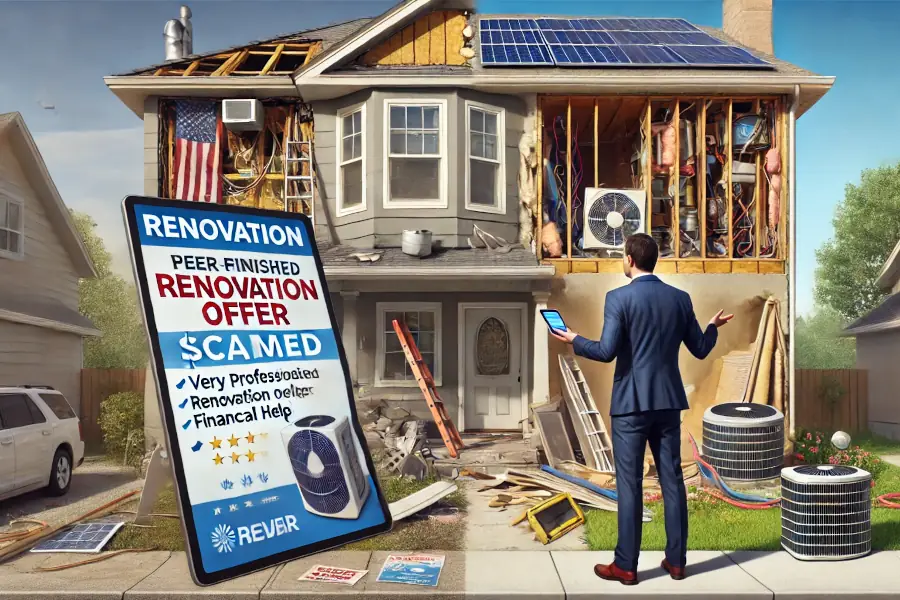

Energy is expensive, bills keep rising, and incentives to improve home efficiency are everywhere. Insulation, heat pumps, solar panels, eco-friendly boilers — energy renovation offers are multiplying, often supported by public aid such as the UK’s Green Homes Grant, the ECO4 scheme, or regional subsidies.
But behind this booming market lurk countless fraudsters exploiting homeowners’ trust. Every year, thousands of households fall victim to fake contractors, unfinished work, or bogus government grants.
A booming sector… and fertile ground for scammers
Government policies encouraging energy-efficient housing have driven the growth of this industry. But success has also attracted criminal opportunists.
The pattern is always the same: a phone call, a doorstep visit, or an online ad promising “£1 insulation” or “100% free solar panels”. The offer seems too good to be true — and it is.
These so-called professionals exploit administrative loopholes and citizens’ lack of knowledge about grant systems. Once they obtain a signature, the scam varies:
- Poor-quality or incomplete renovation work.
- Companies disappearing after receiving the deposit.
- Fake grant applications submitted with falsified documents.
- Overcharged invoices issued in the name of a supposed “partner” or “official intermediary”.
Most common scam techniques
Scammers adapt quickly and use increasingly sophisticated tactics.
1. Aggressive cold-calling
Although banned in most cases since 2023, many homeowners still receive calls claiming to come from “The Energy Saving Agency” or “Government Renovation Support”. In reality, these bodies either don’t exist or never contact people by phone.
2. Deceptive websites
Fake sites mimic government pages, using official-looking logos, red-white-blue colour schemes, and domains like “gov-uk-energy.info”. These forms collect personal data to sell to unlicensed commercial firms.
3. Builders without accreditation
Many companies claim to be “TrustMark” or “MCS certified” when they are not. Yet, certification is mandatory to access public grants in the UK and across Europe.
4. Fake subsidies and refundable advances
Some companies promise total coverage of renovation costs. After signature, they demand an upfront payment to “secure the grant” — then disappear. Others send forged letters or payment confirmations allegedly from public authorities.
5. Abandoned projects
One of the most frustrating scams: after taking a deposit, the firm starts the work, then halts operations, leaving the home unfinished and the client without recourse.
Severe consequences for victims
 Victims face not only financial losses but also serious material and administrative problems.
Victims face not only financial losses but also serious material and administrative problems.
- Major financial damage
Lost deposits, expensive repairs, and costly legal procedures.
- Unsafe or non-compliant work
Bad insulation or faulty systems can cause fires or property damage.
- Loss of real grant eligibility
If the file contains false data submitted by the fraudster, the legitimate grant (for instance from Ofgem or the Energy Saving Trust) may be permanently denied.
- Identity theft
Some victims later discover that fake applications were made in their name without consent.
How to spot an energy renovation scam
Fortunately, several warning signs can help identify fraud before it’s too late:
- Too-good-to-be-true promises
Phrases like “free works” or “zero cost to you” are almost always deceptive.
- Fake urgency
The scammer pressures you to sign immediately, claiming “funds are about to expire”.
- Vague documents without official logos
Legitimate quotes and contracts always include legal information and a verifiable company registration number.
- Upfront payments
Reputable professionals never demand money before a grant is approved.
- Missing certification
Always verify accreditation on the official site trustmark.org.uk.
Recent cases and penalties
In 2024, several companies were prosecuted for defrauding thousands of homeowners.
Among the most notable cases:
- A UK contractor was fined after taking over £2 million in deposits for unfinished works.
- A telemarketing network was sanctioned by the Information Commissioner’s Office (ICO) for illegal cold-calling.
- Fake “energy rebate” brokers were caught using forged government credentials.
These incidents led authorities to tighten regulations and strengthen penalties against deceptive practices.
What to do if you’re a victim
Act quickly if you’ve been targeted:
- Report the fraud to your local police or Action Fraud UK.
- Notify Trading Standards and Citizens Advice.
- Contact your bank to attempt to reverse the payment.
- Keep all evidence (emails, invoices, quotes) for potential legal action.
- If your identity was misused, report it immediately to your local council and credit agencies.
New consumer protections
Since 2024, new measures have been implemented to protect homeowners:
- Ban on energy-renovation cold-calling.
- Mandatory verification of company certification before any public grant approval.
- Creation of a national registry of authorised retrofit contractors.
- Heavier penalties for impersonating government officials or misusing logos.
These initiatives cannot eliminate fraud entirely but make reporting easier and reduce large-scale scams.
How to choose a trustworthy company
Before committing to any work, apply these simple checks:
- Verify the company’s registration on Companies House.
- Ask for several quotes to compare prices and services.
- Never sign under pressure or at your doorstep.
- Confirm TrustMark or MCS accreditation online.
- Prefer contractors listed by TrustMark or your local council’s energy scheme.
If the company goes bankrupt
Some victims discover the business has gone into liquidation soon after signing. In that case:
- Check if your home insurance includes legal protection.
- Declare the loss to the insolvency service.
- File as a creditor to attempt partial recovery.
- Report the case to Trading Standards to add the company to public fraud databases.
Conclusion
Energy renovation scams have become a modern plague, fuelled by complex aid schemes and misplaced trust.
Behind promises of savings and sustainability often hide dishonest practices and major financial losses.
The best protection remains simple: verify before signing.
Never trust offers that sound miraculous or companies pushing for quick signatures.
Home renovation can be a wise investment — but only when handled by certified, transparent professionals.
Always consult TrustMark or a local energy adviser to confirm a company’s legitimacy before committing.
Article by : René Ronse | Review guidelines | Review consultants
About the author: René Ronse, manager of ArnaqueOuFiable.com. Expert in consumer cybersecurity, specialist in detecting online fraud, product transparency, and digital compliance. He has over 20 years of experience analyzing hidden subscription mechanisms, unreadable terms and conditions, aggressive sales tactics, and deceptive commercial practices on the web.
Last updated on 6 November 2025.
This article is also available in : Français - Deutsch - Español - Italiano - Nederlands - Português


![]()

 Victims face not only financial losses but also serious material and administrative problems.
Victims face not only financial losses but also serious material and administrative problems.